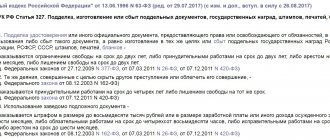The legislator provides for criminal liability for a person guilty of forgery of documents and the use of forged documents. This norm is enshrined in Article 327 of the Criminal Code of the Russian Federation.
ATTENTION: if you are accused of committing a crime under Art. 327 of the Criminal Code of the Russian Federation, you need, obligatory, qualified assistance from our criminal lawyer regarding the elements of the crime associated with forgery of documents. With such support, you can avoid criminal prosecution, conviction and criminal record, or achieve a reduced sentence.
What to do if you are accused of forgery of documents?
How to avoid punishment for forgery of documents? It is important to remember and understand that a competently and clearly constructed position during interrogation is half the success, since the case and your position in this case must be presented in a light favorable to you and in the correct context, taking into account the position taken by the defense
Already at the interrogation stage, you can imagine the situation in such a way that your actions do not constitute an act that is provided for by the Criminal Code of the Russian Federation, and then the investigation (inquiry) will have to prove your guilt, and not you, because the criminal law frees you to prove your innocence (the principle of the presumption of innocence applies on the territory of our entire state and proclaimed by the Constitution of the Russian Federation).
Step-by-step instructions for protection under Art. 327 of the Criminal Code of the Russian Federation
- when familiarizing yourself with the materials of the case on forgery of documents, a petition can be prepared with a reasoned indication of your innocence and indicate procedural violations that occurred during the investigation of your case
- appeal the indictment to the prosecutor, who can make a decision against you to terminate your criminal case
- you need to seek expert examination of the case (for example, handwriting examination) in order to prove your non-involvement in forgery of documents
- prove the absence of intent to use or sell counterfeit documents
- to challenge the fact that you produced counterfeit documents, the fact that you knew that the documents you used were counterfeit will also be called into question, which means that you did not have the intent to commit a crime under Art. 327 of the Criminal Code of the Russian Federation
- appealing the search. If a decision has been made to conduct a search of your home, then the participation of a lawyer in the search procedure will guarantee strict compliance by the investigator or interrogator with the norms of criminal procedural legislation
- appealing the verdict. If the verdict is nevertheless passed in your case, then appealing the verdict in a criminal case can correct a judicial error committed by the court, or change the punishment assigned to the convicted person, which does not always correspond to the act he committed and evaluates the characterizing components of the criminal
- other actions provided for by the law on advocacy and the Code of Criminal Procedure of the Russian Federation, including, no exception, an independent lawyer’s investigation aimed at protecting a person in need of help in proving his non-involvement in the incident.
What is meant by fake
The law does not contain a definitive list of actions that are interpreted as counterfeiting, but classifies such crimes according to intent:
- obtaining rights or material benefits that are not entitled to a particular citizen;
- impersonating another person, including an official;
- avoidance of certain responsibilities.
Note! If the production of a counterfeit was not intended to obtain preferences, and the document itself could not bring them, then the forgery is not an offense.
The object of falsification can be document forms, seals and stamps that give them official status, awards, certificates. The following will be considered counterfeit:
- production of a surrogate using certain technologies;
- illegal use of original forms;
- any unauthorized changes to an authentic document, for example, correction of the validity period;
- sale of counterfeit and intentional use of a homemade document.
In the Code of Administrative Offences, such actions are punishable under Article 19.23 and entail a fine of 30-40 thousand rubles with the confiscation of equipment involved in production.
Criminal legislation considers the problem of counterfeiting more broadly. In addition to the specialized article for forgery of documents 327, the Criminal Code of the Russian Federation contains separate provisions for:
- falsification of election documents – Article 142 refers to illegal manipulations by members of election commissions;
- falsification of banknotes, coins and securities denominated in rubles or foreign currency - sanctions under Article 186, not only for production, but also for transportation and sale;
- counterfeiting of plastic cards, electronic means of payment and other means of non-cash payments, including software for transferring funds - liability under Article 187 also applies for the production of counterfeit, storage of such products, transportation and sale;
- forgery of official papers by an official - Article 292 considers as such both the creation of a document by an employee who does not have the authority to do so, and the indication in an official document of false information for the personal purposes of the person involved;
- counterfeiting of excise stamps.
What is the penalty for forging signatures on documents?
Liability for falsification is established not by the method of production, but by the fact of transfer of a forged document and receipt of some benefit. At the same time, signing instead of an authorized person is a crime that makes the document invalid and the signatory a defendant in a criminal case.
Punishment for the production and use of counterfeit documents
The type of punishment for making and using a fake document depends on what kind of document it is, i.e. a document that provides any rights, or a citizen’s passport, etc., as well as what actions were performed with these documents, i.e. documents were used, stored, transported, sold.
Sanctions parts of Art. 327 of the Criminal Code of the Russian Federation provides for the following types of punishments:
- fine up to 80 thousand rubles. or in the amount of salary or other income for up to 6 months
- compulsory work up to 480 hours
- restriction of freedom up to 1 year, up to 2 years, up to 3 years
- forced labor up to 1 year, up to 2 years, up to 3 years, up to 4 years
- arrest up to 6 months
- imprisonment up to 1 year, up to 2 years, up to 3 years, up to 4 years
As you can see, the types of punishments under the article in question can be assigned very different, depending on the specific circumstances and qualifications of the person’s actions under the specific part of the article in question. When assigning a sentence, the court will also take into account mitigating and aggravating circumstances in the case.
In addition to the punishment, the person will receive a criminal record, which will cause certain troubles for the convicted person.
What does Article 327 of the Criminal Code of the Russian Federation say? Forgery of documents
Under Article 327 on falsification of documents, one can be held accountable only for the production for personal use, presentation or sale of:
- strict reporting forms or standard unprotected forms from various departments;
- stamps and seals;
- certificates and other documents confirming the identity or status of the bearer;
- state awards of Russia, the RSFSR or the USSR. Sanctions do not apply to foreign awards and other products.
Note! Not only the production, but also the fact of presenting a forgery at the place of demand is punished if the bearer knew about the invalidity of the document.
Statute of limitations for forgery of documents
The statute of limitations for falsifying documents will depend on the qualifications of the person’s actions and the sanctions of the specific part of the article.
If the sanction provides for a maximum penalty of imprisonment of up to 3 years, i.e. the crime is of minor gravity, the statute of limitations for bringing to justice is 2 years after the commission of the relevant act.
If the punishment is provided with imprisonment for up to 5 years, i.e. the crime is of average gravity, the statute of limitations is 6 years.
From the above information it is clear that the maximum punishment under Art. 327 of the Criminal Code of the Russian Federation is provided for in the form of imprisonment for up to 4 years, respectively, the statute of limitations for forgery of documents is 2 years and 6 years, depending on the severity.
The RF Armed Forces submitted to the State Duma a bill on the decriminalization of a number of articles of the Criminal Code
According to the data of the Judicial Department under the Armed Forces of the Russian Federation, 19-21 thousand people are convicted annually under the article “beatings”, under the article “threat of murder or causing grievous harm to health” - 30-31 thousand people, under the article “malicious evasion of payment of child support” or disabled parents”, the number of people convicted over the past two years annually exceeds 60 thousand people; about 15-16 thousand people are convicted per year under the article “using a knowingly forged document”. “The proportion of persons convicted of these crimes is about 40% of the number of persons convicted of all crimes of minor gravity according to the main qualifications. Every year, 130-140 thousand people are convicted of these crimes according to basic and additional qualifications,” the explanatory documents say.
Over the past three years, more than 400 thousand people have been convicted under part one of article 116, part one of article 119, parts one and two of article 157 and part three of article 327 of the Criminal Code of the Russian Federation.
Of the nearly 130 thousand people convicted of these crimes in 2014, approximately 95% of people were given punishments that did not involve isolating the convicted person from society, the explanatory note says.
“Removing these acts from the scope of criminal law will not entail a violation of the principle of justice,” the document notes.
If the provisions of this part of the bill are implemented, about 200 thousand persons may be removed from the scope of the criminal law.
Petty theft
In addition, in order to implement the principles of justice, humanity and saving criminal repression, the bill proposes to increase the amount of theft of someone else's property, which triggers criminal liability, from 1 to 5 thousand rubles. To this end, the bill, which is being introduced simultaneously with this bill, proposes amendments to Article 7.27 of the Code of Administrative Offenses of the Russian Federation “Petty theft.”
“At the same time, to ensure adequate protection of property rights, the bill proposes to supplement the Criminal Code of the Russian Federation with a new article 1581, which would establish criminal liability for committing petty theft by a person subject to administrative punishment for similar actions,” the explanatory note says.
According to the authors of the bill, this will make it possible to properly respond to the illegal behavior of persons prone to systematic theft of other people's property.
Grounds for exemption from criminal liability under Article 327 of the Criminal Code of the Russian Federation
In cases specified by law, a person may be exempt from liability for forgery, production and circulation of documents, namely:
- if the statute of limitations for bringing a person to justice has expired
- if the person committed the specified act for the first time, and most importantly, confessed of his own free will, and also contributed to the detection and investigation of the crime, compensated for the damage caused, repented of the committed act, thereby ceasing to be socially dangerous
- The law also establishes the possibility of exemption from liability if a person has reconciled with the victim, however, given the specified elements of the crime, it is difficult to imagine reconciliation with the victim, since the victim may be some kind of government agency or organization, and it is unlikely that one can count on reconciliation with government agencies, but such a possibility provided
A person may also be released from liability and subject to a court fine if the following conditions are met:
- the person committed the relevant act for the first time;
- the person compensated for the damage or somehow made amends for the harm caused.
Please note that in most of the above cases, a person may or may not be released from liability, so you should not expect that if something happens, you will be released from responsibility and it seems that the committed act will not entail any special consequences.
ATTENTION: watch a video about defending the rights of the accused by a lawyer and subscribe to our YouTube channel, you will have access to free legal assistance from a lawyer through comments on the video.
Decriminalization of Part 1 of Article 116; Part 1 of Article 119; Art. 157 and Part 3 of Art. 327 of the Criminal Code of the Russian Federation in 2021
In the spring of 2021, the State Duma of the Russian Federation adopted in the first reading two bills on the decriminalization of a number of criminal offenses.
The new rules establish that a person who has committed a crime of minor or medium gravity for the first time may be released from criminal liability and instead subjected to criminal measures if he is compensated for the damage or otherwise made up for the harm caused by the crime.
The following types of punishment may be applied as measures: fine, deprivation of the right to hold certain positions or engage in certain activities, compulsory labor or correctional labor. In case of malicious evasion of the offender from paying a fine or serving other measures of a criminal legal nature, the corresponding measure is canceled, the materials are sent to bring the person to criminal responsibility, the document says.
The bill proposes to decriminalize several types of illegal acts, establishing administrative liability for them. Among them are beatings (Part 1 of Article 116 of the Criminal Code of the Russian Federation) and threats of murder or infliction of grievous bodily harm (Part 1 of Article 119 of the Criminal Code of the Russian Federation). According to the draft, criminal liability will occur only if such crimes are committed on the grounds of political, ideological, racial, national or religious hatred or enmity, or on grounds of hatred or enmity against any social group, and for beatings - also from hooligan motives.
It is established that if a person has previously been subject to administrative punishment for beatings and threats to kill, then the second time the offender will suffer criminal punishment.
Decriminalization also included malicious evasion of payment of alimony for the maintenance of children or disabled parents (Article 157 of the Criminal Code of the Russian Federation) and the use of a knowingly forged document (Part 3 of Article 327 of the Criminal Code of the Russian Federation), with the exception of a knowingly forged official document.
For these four elements of administrative offenses, a two-year statute of limitations for prosecution is established, and the consideration of relevant administrative cases is assigned to the jurisdiction of the courts. In addition, the possibility of conducting an administrative investigation is provided.
In addition, the bill increases the amount of theft of someone else's property, which entails criminal liability, from 1 thousand to 5 thousand rubles. At the same time, criminal liability for committing petty theft by a person previously subjected to administrative punishment for similar actions remains. The proposed changes will not apply to group and other qualified forms of theft, which still provide for criminal liability.
If no one doubts the abolition of criminal prosecution under Part 3 of Article 237 of the Criminal Code of the Russian Federation, then the abolition of criminal prosecution under Part 1 of Article 116 of the Criminal Code of the Russian Federation, for beatings, has repeatedly caused a storm of protest and indignation both among lawyers and among citizens . Will the country be overwhelmed by a wave of virtually unpunished violence......
02/26/2016. Lawyer in the city of Togliatti Sibalakov Alexey Gennadievich.
Assistance from a lawyer in defense under Article 327 of the Criminal Code of the Russian Federation in Yekaterinburg
Our criminal lawyer in Yekaterinburg will help you in the framework of your criminal case under Art. 327 of the Criminal Code of the Russian Federation in the following areas:
- at the stage of initiating a criminal case against you, analyze the situation, consultation with a criminal lawyer will help you understand your rights, find out the reality of the intentions of law enforcement agencies, determine the prospects of the case, find out judicial practice regarding sentencing for crimes of forgery of documents
- After analyzing the case, checking the facts and evidence that the investigation has established and collected as part of the case of forgery of documents, the lawyer, together with you, will develop a line of defense
- we organize visits by a lawyer to a pre-trial detention center or other detention center if the court has chosen a preventive measure in the form of arrest against the suspect (accused), because he especially needs support and assistance at this moment, given the situation that surrounds him there
- After developing a position, the lawyer will prepare you for interrogation, will be present at the interrogation, tell you what rights you have and how to use them without harming yourself. The participation of a lawyer in questioning a person (suspect, accused) by law enforcement agencies will give you additional confidence and the opportunity to defend your position 100%, will not allow you to get confused when answering tricky questions from the investigator, and will also organize control over the legality of the investigative action being carried out on the part of the investigator (investigator).
Considering the seriousness of your situation, if you are accused of forgery of documents, as well as the use of forged documents, you need qualified and professional assistance from a lawyer in forgery of documents now.
Statute of limitations under Article 327 of the Criminal Code of the Russian Federation
The expiration of the statute of limitations, after which the attacker cannot be punished by law, is established by Article 78 of the Criminal Code of the Russian Federation. For falsification of documents, the period of 2 years expires, since forgery is not considered a serious or especially serious crime.
Note! If the offense was long-term, the statute of limitations will begin to count from the last benefit received, and not from the date the document was created. Each new offense automatically starts the countdown of the statute of limitations anew.
Ways to bring to justice
If a forgery is detected, the police conduct a preliminary investigation and initiate a criminal case based on the revealed fact. Law enforcement officers can prosecute for falsification on the basis of:
- examinations that will prove the forgery of a signature, seal or the entire document;
- identifying the manufacturer, establishing the fact of transfer of counterfeit papers and seals;
- establishing the fact of using a forged document to obtain additional rights or get rid of obligations.
If a citizen was a victim of deception and did not know about the invalidity of the document, he will not bear responsibility for using a fake.









